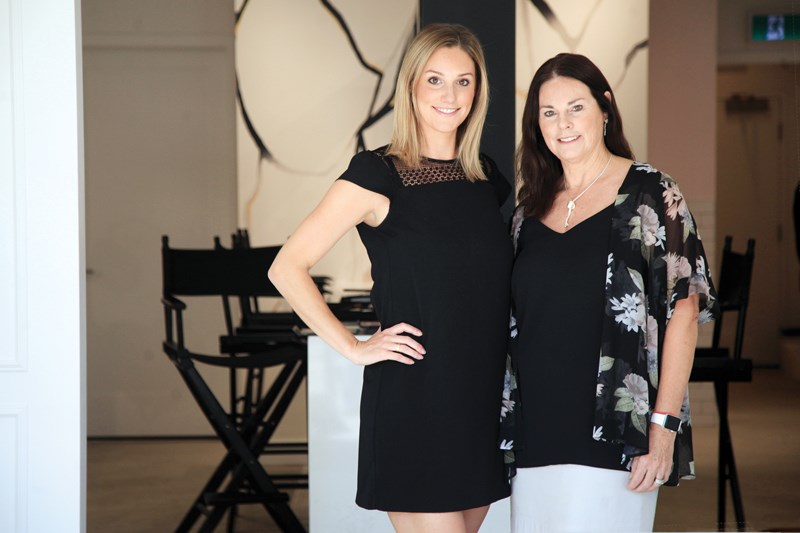Deep Cove resident Dolores Elliott and her daughter Denise have a lot to celebrate these days.
Denise is coming up on the one-year anniversary of her award-winning makeup and hair salon in Lower Lonsdale. More importantly, Denise is alive.
When she was 14 years old, Denise had big dreams.
“I always wanted to be my own boss and have a store of some sort,” she says. “I loved doing makeup from a young age as I danced all my life.”
At the same time Denise struggled with an eating disorder. Dolores suspects it was brought on by an avalanche of stress.
There was a spate of tragic family events. Denise’s grandparents died, a couple of her friends’ fathers died suddenly and the family dog also died.
“She experienced so much grief in a really short period of time for a young person,” says Dolores, sitting in a bright bay window at her daughter’s bustling boutique.
Eating was what Denise could control in the face of all that unexpected agony. Feelings of anxiety had started creeping into Denise’s life when she was 10 years old and told her mom she didn’t feel right.
They went to the doctor, who pulled out a growth chart and decided Denise was physically within a healthy range.
“So unfortunately we discounted her feelings,” says Dolores.
“I was definitely feeling alone,” says Denise. “No one really would understand me and what I was feeling and could see. I started to isolate myself with friends and family and couldn’t commit to things as I was so scared about what people would think.”
At the same time, her family was worried sick and frustrated about the lack of publicly funded treatment in B.C. for eating disorders. Desperate to save her daughter, Dolores sent Denise to a renowned treatment facility in Arizona, at a cost of $2,000 a day.
Denise spent 67 days there. Some B.C. parents who went the same route had to remortgage their homes to pay the hefty bill. While it was expensive, the families found the non-clinical environment was conducive to their child’s recovery.
In the face of limited local care and treatment options, Dolores, along with fellow North Van mom Deborah Grimm and Vancouver mother Cindy Dobbe, started the Looking Glass Foundation in 2002.
What began with summer camps and support groups grew into the mothers’ vision to open Canada’s first publicly funded residential eating disorders facility for young people on a sprawling nine-acre property on Galiano Island.
Today, Looking Glass Residence offers a live-in care and treatment program in Vancouver for young B.C. men and women, ages 17-24, who are experiencing a variety of eating disorders. Looking Glass currently has 730 young people suffering from eating disorders in its database.
Over the years more than 1,000 people have been helped by the not-for-profit society, which has a network of more than 675 volunteers, many of whom have themselves suffered from an eating disorder.
“We’re really happy with the progress we’ve made with opening up the residence and how many people we’ve helped,” says Dolores, reflecting on how far Looking Glass has come.
But there’s still work to be done, including eradicating the stigma around eating disorders in men and getting them into treatment.
“They need to realize the help is there for them as well,” says Dolores.
While in one sense Dolores has moved on from that tumultuous period when her daughter was sick, she is still championing the cause.
“My heart is still in it, which is key. I feel sad for people whose kids are still struggling,” says Dolores, watching Denise laugh and orbit around the salon as the sun streams in.
When supporting parents whose children are currently struggling with an eating disorder, Dolores doesn’t sugarcoat her family’s story. She prepares them for the long journey, which in Denise’s case lasted nearly a decade.
“That’s a huge gap in somebody’s life,” says Dolores.
Denise is grateful for her family’s support and how much Looking Glass Foundation has helped others with eating disorders.
“I think it’s incredible at how far it’s grown over the last 15 years,” says Denise. “There are so many programs and support to help individuals. It means so much to me and I can’t believe how far it has come.”
Denise has been out of the woods for a decade. But because eating disorders are often rooted in mental illness Denise still checks in with herself to stay healthy. And she offers advice to other young people on the journey.
“It’s a serious struggle but just to remember you can’t compare yourself with others and to be happy with who you are,” says Denise.
Dolores and Denise are gearing up the foundation’s fall fundraiser, A Very Gatsby Affair, featuring live music of the Roaring ’20s era, signature cocktails, a luxury silent auction, fascinator competition and a Prohibition Cash Bar, set for Vancouver’s Sutton Place Hotel on Oct. 14 from 7 to 11 p.m.
Annually, Looking Glass raises approximately $925,000, which supports the foundation’s many programs including summer camps, online peer support, scholarships, recovery events and residential treatment.
“Our fundraising money goes out the door pretty quick,” says Dolores, explaining that’s why Looking Glass puts on charity events four times a year.
According to the stats provided by Looking Glass, some 1.5 million Canadians are believed to be affected by eating disorders in some way.
Looking over at her daughter managing her successful business, Dolores smiles and breathes easily.
“Everything has come to fruition for her, which is wonderful and we’re thrilled,” says Dolores.



